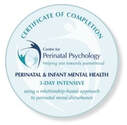|
At least 50% of people are unhappy with how they were parented, suffer from a harsh inner critic and struggle to feel good-enough as an independent adult. Sometimes people are vividly aware of the insufficiency, neglect or cruelty of the parents. Others struggle with the confusion of a parent who seems to love them, , at least now, yet they are unaware that a lot of the 'damage' is done way before they can speak or remember. While we can't go back in time or redo in the now what we should have had as an infant we can use our adult brain to help remediate somethings. When the baby is small it is right brain dominant. Experiences are coded in the right brain prior to language creating whole concept or 'gist' feelings. The left brain doesn't really come online until late in the second year of life and even later can language can be used to interpret right brain feelings and thoughts. Once the child begins to use language the effect of the parental influence becomes consolidated in life experiences and their interpretation. The way a parent interacts with the child shapes how the child thinks feels and interprets. However, this can be used to 'tell' a child all is well or thier fault. This inner sense of blame and shame carry's forward with us but as adults we can take responsibility for how we feel and start to reparent ourselves. THE TYRANNY OF THE SHOULD'S Our parents way of relating to us becomes part of our ongoing internal dialogue. As children we want our parents love and approval. This involves dealing with our individual urges and impulses wagered against parents expectations. Our selves are many selves, we have different ways of being and relating, therefore create different persona's in different situations. By necessity we learn to subjugate our wants and needs in order to be socially acceptable- we split ourselves into a good girl/ boy who makes mommy or daddy happy and proud and a bad one who gets told off or in some way isn't measuring up to expectatoins. If you watch pre-school play you will often hear this inner split acted out in its dialogue. "Oh don't do that dolly, that's bad, you will get in trouble." Splitting of self into acceptable and unacceptable (shameful and pleasing) starts when we are about 1.5 years old and forms into an inner idea/concept (schema) of the protecting, punishing parent which later merges with other authority figures and cultural values. Freud called this psychological structure the superego, many have re-hashed it as the inner critic. I refer to it as the Tyranny of the should's because this voice can almost always be identified by sentences starting with "I should, I could have, I should not have.." etc. It is this inner voice ( in some it is not a voice but a bodily sensation of inhibition) that causes much grief in our lives. For some it is as if they carry and inner parent who is constantly telling them how wrong, bad, deficient and inadequate they are. And while the parents may have been in some part responsible for the beginning of this voice it has been sculpted over the years by many other experiences and is almost universal (except in a true narcissist or psychopath). But the truth is that as we grow as adults this voice of inner should-ing is now very much our own. Hence there is no point blaming our parents, we continue this inner running dialogue and only we can change it. REPARENT YOURSELF Reparenting has less to do with our parents being inadequate and more to do with the fact that we are now independent adults. Due to a lack of ritual or clear demarkation of adulthood in western culture we tend to have blurry lines around just how much effect our parents should have on us as adults. This inteferes with our maturation into fully fledged grown-ups. Adult children still living at home jostle with becoming an independent but even adult children living away from their parents can have expectations and complicated separation from parental influence. In psychology we refer to the process of a child becoming an adult in his or her own right and not remaining enmeshed in a child-like relationship with parents 'differentiation'. Culture rightfully values the sanctity of the family system yet fails, beyond age-related graduation to adult privileges like voting and driving, to provide guidelines of how to become an adult in your own right. The result is that we struggle with feeling too much or too little responsibility for how we are. We simultaneously resent or blame parents while holding unmet needs for love and approval. It can manifest as a never ending conflict between feeling pulled to meet the parents expectations while arguing and fighting for the importance of our own. This is not always a problem. When parents have done a 'good enough' job of instilling a sense of security and confidence in the child (which starts with newborn attachment - not just a 4 year old receiving plentiful praise) and they themselves have clear boundaries and a reasonable knowledge that their adult child needs to now trot off and build their own family and life, things go reasonably well. I seldom see such people in my consult room. People who come to see me invariably have issues with parents and boundaries, unmet needs for approval, unreasonable expectations for success, and neglect underpinning their problems. Alternately the parents remain enmeshed in the adult's life, driving decisions and interferring in their intimate relationships. Okay, so things were not and never are perfect in the early years, parents usually do the best they can based only on what they know and have experienced. Its no ones fault, so what do we do? Well, the cool thing is, when we are grown and we are developed both hemispheres we can use our left brain, our inner language and our self cultivated compassion to re-parent our right brain. But first lets take a deeper look at the end result of unmet needs. NOT GOOD ENOUGH SYNDROME Many of us spend our lives trying to up to our idea of what will make mummy or daddy proud. This may not be apparent to the average person, but if we chase their inner should's and have a good look at the idealised image of who they think they should be we can often find at the end of it a hope such as "and then my father will finally say he is proud of me" or "Then maybe my mother will love me/see me how I want to be loved/seen". We carry this notion over into our intimate relationships, hoping that one day a magical lover will 'see' or 'find' us and we will feel completely accepted and loved for being just the way we are. Meanwhile we push ourselves to jump through flaming hoops because basically, we never really feel we are 'good enough'. The not good enough syndrome is a universal plague on wellbeing. Unless you have afforded yourself immunity though the inoculation of psychopathy (where you really don't care what others thing of you) or narcissist personality disorder (where you do care but have built a solid wall of how good you already are) you are nurturing, at some deep level, the lurking fear that you are a shallow fabrication of humanity and one day everyone will see what a worthless worm you truly are. Chasing this to the extreme is the existitential doom that we will die sad and alone. This syndrome is not such a problem in the securely attached well loved and adequately nurtured amongst us, but for the 50% of us who did not have inherit a basic sense of trust in ourselves and the world, we struggle. These issues sound deep, devastating and down-right impossible to alter, right? Basically this is due to the fact that to the unaware they sit under the surface cycling in and out of influence. What you can do is to shine a light to put a spoke in their wheels. Become aware of your inner should's and know them as the tyrant they are. Get in touch with your self-loathing and be kind to yourself. The tyranny of the should's tell you how wrong, inadequate and worthless you are. How you should have done this and shouldn't have said that. Blah, blah, blah. This voice runs like a recording of self abuse in what should be your quietest moments - especially as you try to sleep or when you wake. Further, when you want to change anything in your life this voice will kick in and tell you what a bad and dangerous idea that is. This is because its original job was to keep you safe. Solution? Thank it, then tell it to F-off. SELF-COMPASSION IS KEY A good way to realise when you are on a roll of self abuse is to ask yourself, if a friend was talking about themselves in the same way, would you let them continue? Of course not, you would override their negativity and say something nice. So start saying nice kind things to yourself. Become your own version of a good parent. Once you have interrupted your tyrant, over-ride its negative influence by cultivation your own good inner parent. Say something nice like a good mum or dad would. For example: "Oh dear, you couldn't have known they would hear that, we all make mistakes, look at the great thing you did yesterday, helping that person, completely that task, getting up on time." Think of something nice to say to implant a positive coach or calming voice in place of the punitive pain in the ass. Just as you wouldn't launch a should have attack on a friend you would also console them would compassion, right? For many of my clients the concept of self compassion is like hearing a foreign word. Yet compassion for ourselves as well as others is the one quality I would increase in the world. Without the ability to recognise your own humanity you will struggle to fully support the messy flaws in your children and others. Practice inner kindness, acceptance of your faults (because we all have them) and send love and compassion to your little hurt inner child. Self compassion is truly the key to neutralising negative self talk. TIME TO GROW UPOf the things I have mentioned here the main message is that it is actually not in your interests to continue to try and please your parents now you are an adult, because the short truth is, it will never satisfy. The window of parental influence closed decades ago. What was missed then can never be made up for, now it is your job to grow up, separate from the need to please your parents and be your very own person. By cultivating our inner good parent we can also lay the framework for becoming better parents to our children.
When we are running scared of displeasing daddy or still mad at mummy we are letting our personal power leak. We are run by unseen forces and this is naturally going to result in inner conflict. Forgive your parents and then, let them go. Spit up all the values, ideas, beliefs and judgements that our well-meaning parents had us swallow hole and look into our story about ourselves so we can re-write a new narrative that is all ours. This doesn't mean you have to rebel or turn against your family, this is what you should have done in adolescence. There are cases were the parents are so toxic that you may consider a cut-off but fighting doesn't change much and continues a negative relationship. You simply learn to love your folks while standing in your own power, patting your own back and being your own number one supporter. Then you can call yourself a grown-up. Posts regarding integrative medicine, human behaviour, psychotherapy, gestalt therapy, bio-chemical disorders; pyrrole, methylation, copper and zinc imbalances, child behaviour, family relationships, parenting.
0 Comments
Your comment will be posted after it is approved.
Leave a Reply. |
AuthorClarissa Mosley Categories
All
Archives
November 2022
|

 RSS Feed
RSS Feed



